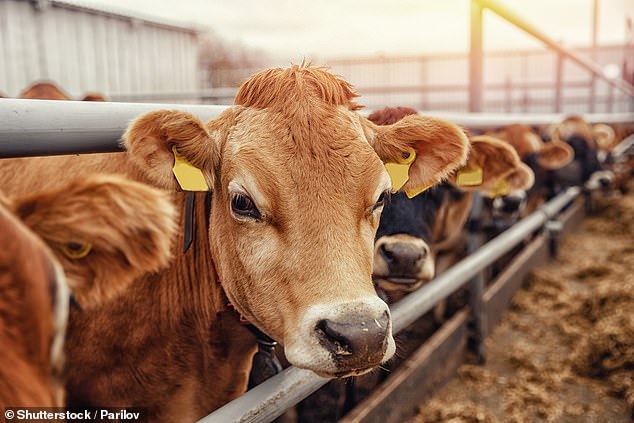A dangerous superbug commonly found in cattle can jump to humans, and researchers warn that infections may soon become untreatable.
A team from Penn State University discovered that Salmonella Dublin has become increasingly resistant to antibiotics and is spreading to humans through contaminated beef, milk, or cheese, or through direct contact with infected cows.
Researchers studied 2,150 Salmonella Dublin strains from cattle, humans, and the environment and found they were all genetically similar, making it easier for the bacteria to spread across species.
This bacterium typically causes severe illness or death among cows, but it can also result in serious blood infections among people, especially those in close contact with farm animals. In severe cases, Salmonella Dublin can kill people.
Making matters worse, the new study revealed that cattle strains have the highest levels of antibiotic resistance, particularly to drugs meant for treating infections, such as tetracycline and cephalosporins.
The increasing antibiotic resistance means that infections may become harder to treat, potentially leading to longer illnesses or more severe symptoms for people and animals.
If treatments become less effective, human infections could become more dangerous, especially for vulnerable groups like the elderly, children, or those with weak immune systems.
Study authors added that the US, being a major beef and dairy-producing country, is at an even greater risk of this superbug turning into a widespread health emergency.

Cattle are the main carriers of a superbug called Salmonella Dublin, an antibiotic-resistant bacterium (Stock Image)

Penn State researchers (pictured) found that the bacteria was present in cows, people, and in both food and farm surfaces
The researchers used data from two public sources: the National Center for Biotechnology Information Pathogen Isolate Browser and the National Antimicrobial Resistance Monitoring System.
These provided whole-genome sequences of Salmonella Dublin, which allowed the team to examine each strain’s genes in detail.
They compared 581 samples from cattle, 664 from humans, and 905 from the environment (food and farm areas) to identify patterns in how the bacteria’s genes cause severe disease and resist antibiotics.
The bacteria from cows, people, and the environment were incredibly similar, with 72 percent of the 2,150 strains differing by only a few DNA changes.
Although cow strains had the most genes that were resistant to medication, those found contaminating food and surfaces had more DNA mutations linked to quinolone resistance, a drug used to treat humans.
However, the study published in Applied and Environmental Microbiology warned that each strain examined had similar genes that make them dangerous, like those helping them stick to cells or invade the body.
These genes were present in almost every strain in cows, people, or food, meaning the bacteria are consistently harmful no matter where it’s found.
Study leader Erika Ganda, an associate professor of food animal microbiomes, said in a statement: ‘That’s important, because it shows that Salmonella Dublin is highly connected across humans, animals and the environment — so efforts to control it need to consider all three.’

Contaminated beef can make people sick with Salmonella Dublin, leading to blood infections (Stock Image)

Direct contact on farms can also transmit the bacteria from cattle to people (Stock Image)
The Centers for Disease Control and Prevention (CDC) has estimated that Salmonella bacteria, including Dublin, cause about 1.2 million illnesses every year in the US.
Salmonella Dublin infections have been particularly severe due to their tendency to cause bloodstream infections.
Between 2005 and 2013, a staggering 78 percent of Salmonella Dublin infections required hospitalization, and 4.2 percent resulted in death.
The Food and Drug Administration (FDA) treats Salmonella outbreaks, including those involving Dublin, as high-risk health emergencies, often issuing urgent recalls to prevent their spread.
One incident in 2019 saw 34,222 pounds of contaminated ground beef from Central Valley Meat Company in California recalled to prevent a large-scale outbreak.
However, 13 people were infected with Salmonella Dublin in the state, and one died.
Now that the bacterium has become resistant to antibiotics, the threat to humans is greater than ever.
The CDC has said that antibiotic-resistant infections, including those from Salmonella, cause over 2.8 million illnesses and more than 35,000 deaths each year in the US.
The researchers emphasized the need for a ‘One Health’ approach, combining efforts in human, animal, and environmental health to control the superbug’s spread and reduce antibiotic use in livestock.
This article was originally published by a www.dailymail.co.uk . Read the Original article here. .

